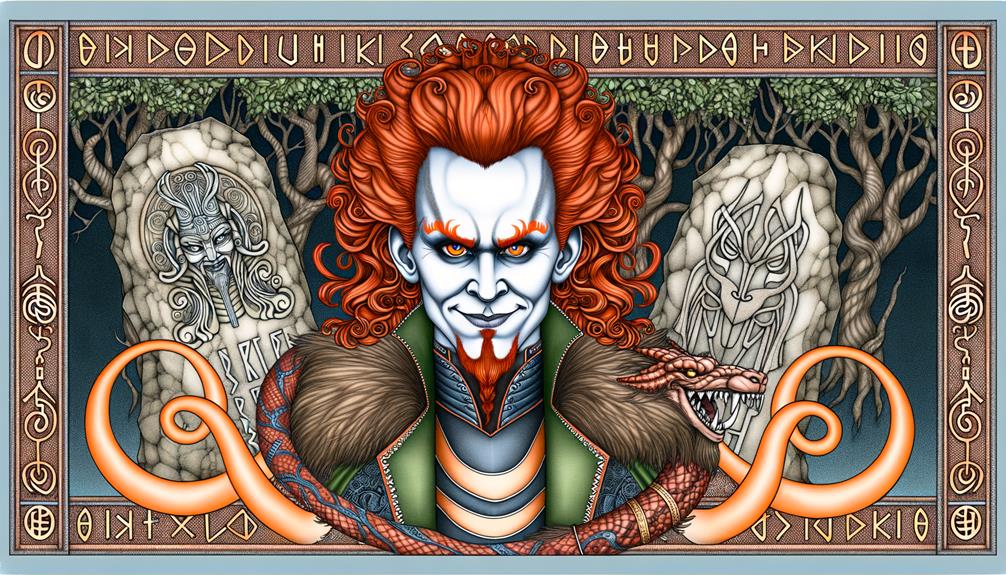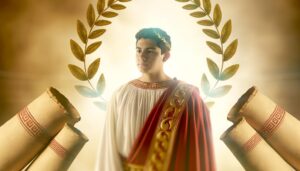Loki Name Meaning and Origin
Loki's name, deeply rooted in Norse mythology, signifies his intricate role as a trickster and a catalyst for transformation. The etymology likely derives from the Old Norse "lúka," meaning "to close" or "to end," and perhaps Old High German "loh," translating to "fire." Symbolically, his name embodies endings, fiery nature, and transformational power.
Literary depictions, from the Poetic Edda to Neil Gaiman's works, portray Loki as a shape-shifter and an agent of chaos, reflecting his existential and cosmological significance. If you seek further, you'll uncover nuances and implications of his name across various contexts.

Key Takeaways
- 'Loki' derives from Old Norse 'lúka,' meaning 'to close' or 'to end.'
- It may be related to Old High German 'loh,' translating to 'fire.'
- Loki's name reflects themes of endings, transformations, and fiery nature.
- Connections to 'lock' suggest a binding or entangling force, aligning with Loki's role.
- Loki's name embodies his role as a trickster and catalyst for change in Norse mythology.
Norse Mythological Roots
Loki's name, deeply embedded in Norse mythology, reflects his complex role as both a trickster and a catalyst for change within the pantheon of gods. Central to many mythological narratives, Loki's actions often oscillate between aiding the gods and bringing about chaos.
His dual nature is exemplified in stories where he both assists and deceives his fellow gods, such as his involvement in the creation of Mjölnir and the tragic sequence leading to Balder's death. This ambivalence underscores the thematic dualism prevalent in Norse mythology, where Loki embodies the unpredictable forces of transformation and disorder.
His mythological roots highlight the intricate balance between stability and chaos, serving as a narrative device to explore existential and cosmological themes.
Etymology of Loki
In examining the etymology of the name Loki, it is essential to explore into the Old Norse language and its linguistic roots to fully understand the complexities and nuances embedded within the name.
The name 'Loki' is believed to derive from the Old Norse word 'lúka,' meaning 'to close' or 'to end,' which is reflective of the god's association with endings and transformations.
Some scholars argue that the name is related to the Old High German 'loh,' translating to 'fire,' hinting at Loki's fiery, often destructive nature.
Additionally, connections to the term 'lock' suggest a binding or entangling force, aligning with Loki's mythological role as a trickster and agent of chaos within the Norse pantheon.
Loki in Literature
Throughout centuries, Loki's character has been richly explored and reinterpreted in various literary works, reflecting his multifaceted role in mythology and his enduring allure as a symbol of chaos and transformation. From the Poetic Edda to contemporary literature, Loki's presence is marked by a complex interplay of mischief, intelligence, and moral ambiguity. His frequent portrayal as a trickster challenges societal norms and provokes thought on the nature of order and disorder.
| Literary Work | Representation of Loki |
|---|---|
| Poetic Edda | Trickster, Shape-shifter, Catalyst for Change |
| Richard Wagner's Ring | Antagonistic figure, embodiment of deceit |
| Neil Gaiman's Norse Mythology | Sympathetic trickster, nuanced character |
Such varied depictions exemplify the literary fascination with Loki's enigmatic persona.
Loki in Popular Culture
As literature has continually reimagined Loki's character, his influence has seamlessly extended into popular culture, where he is celebrated and scrutinized across various media forms. This multifaceted representation underscores Loki's enduring appeal and adaptability.
- Film and Television: Loki's portrayal by Tom Hiddleston in the Marvel Cinematic Universe has captivated audiences, rendering him a complex, charismatic antihero.
- Video Games: Loki appears in numerous video games, such as 'God of War' and 'Smite,' where his cunning and shapeshifting abilities are pivotal.
- Comics and Graphic Novels: Marvel Comics has long featured Loki, exploring various dimensions of his character from trickster to tragic figure.
These depictions illustrate Loki's versatility and enduring relevance in modern storytelling.
Symbolism and Attributes
Rooted in ancient mythological traditions, Loki's symbolism and attributes encompass a complex interplay of mischief, transformation, and duality. As a Norse deity, Loki is often portrayed as a trickster god, embodying chaos and unpredictability.
His shape-shifting abilities signify fluidity and adaptability, allowing him to traverse boundaries and challenge the status quo. Loki's dual nature is manifest in his capacity for both benevolence and malevolence, aiding gods in some myths while causing their downfall in others.
This ambivalence underscores a deeper philosophical inquiry into the nature of good and evil. Additionally, Loki's role in Ragnarok, the prophesied end of the world, accentuates his position as a catalyst for transformation and renewal within the mythological canon.
Modern Usage of Loki
The modern usage of the name Loki has expanded greatly, influenced largely by its prevalence in popular culture, especially within the Marvel Cinematic Universe. This cultural proliferation has also led to a rise in the name's popularity for pets, with owners often attributing mischievous and cunning traits to their animals.
Moreover, the character traits associated with Loki have permeated various forms of media, shaping contemporary interpretations and applications of the name.
Popular Culture References
Loki's presence in popular culture has surged in recent years, largely driven by his prominent role in the Marvel Cinematic Universe, which has redefined the Norse trickster god for contemporary audiences. This modern reinterpretation has sparked widespread interest and has permeated various aspects of popular culture.
- Marvel Cinematic Universe:
Loki, portrayed by Tom Hiddleston, is a central character, evolving from a villain to a complex anti-hero, influencing global pop culture.
- Television Series:
The Disney+ series 'Loki' explores his multifaceted nature, further cementing his popularity and expanding his mythos.
- Literature and Comics:
Numerous books and graphic novels have reimagined Loki, blending traditional mythology with modern narratives, reflecting his enduring appeal.
Pet Naming Trends
Amidst Loki's resurgence in popular culture through film, television, and literature, his name has increasingly become a favored choice for pet owners seeking a moniker that embodies mischief and charm. This trend aligns with a broader societal shift towards names that reflect personality traits or mythological significance. The name Loki, associated with the trickster god from Norse mythology, is particularly popular among pet owners who desire a name that conveys both intelligence and playful unpredictability.
| Pet Type | Popularity of Name Loki |
|---|---|
| Dogs | High |
| Cats | Moderate |
| Ferrets | Increasing |
| Reptiles | Emerging |
| Birds | Low |
This table illustrates the varying popularity of the name Loki across different pet types, highlighting a trend that speaks to the cultural impact and adaptability of mythological names in contemporary pet naming conventions.
Character Traits Influence
Many individuals are drawn to the name Loki for its encapsulation of complex character traits that resonate with contemporary values of intelligence, cunning, and playful unpredictability. This name's modern usage reflects a fascination with multifaceted personalities that challenge conventional norms.
The character of Loki, often associated with Norse mythology and popular culture, embodies a blend of charisma and mischief, making it appealing for various contexts, including literature, media, and personal naming choices.
Key influences of Loki's character traits in modern usage include:
- Intellectual Agility: Loki symbolizes quick thinking and strategic planning.
- Ethical Ambiguity: The name represents moral complexity, often blurring lines between heroism and villainy.
- Playful Irreverence: Loki's unpredictable nature appeals to those valuing freedom from societal constraints.
Conclusion
In summation, the name Loki, deeply rooted in Norse mythology, encompasses complex etymological origins and rich literary traditions.
How has this enigmatic figure evolved from ancient myths to modern popular culture? The transformation signifies the enduring fascination with Loki's symbolism and attributes.
Contemporary usage reflects a multifaceted character whose legacy continues to captivate and inspire. The study of Loki hence reveals broader cultural and psychological themes, underscoring the timeless nature of mythological archetypes.






